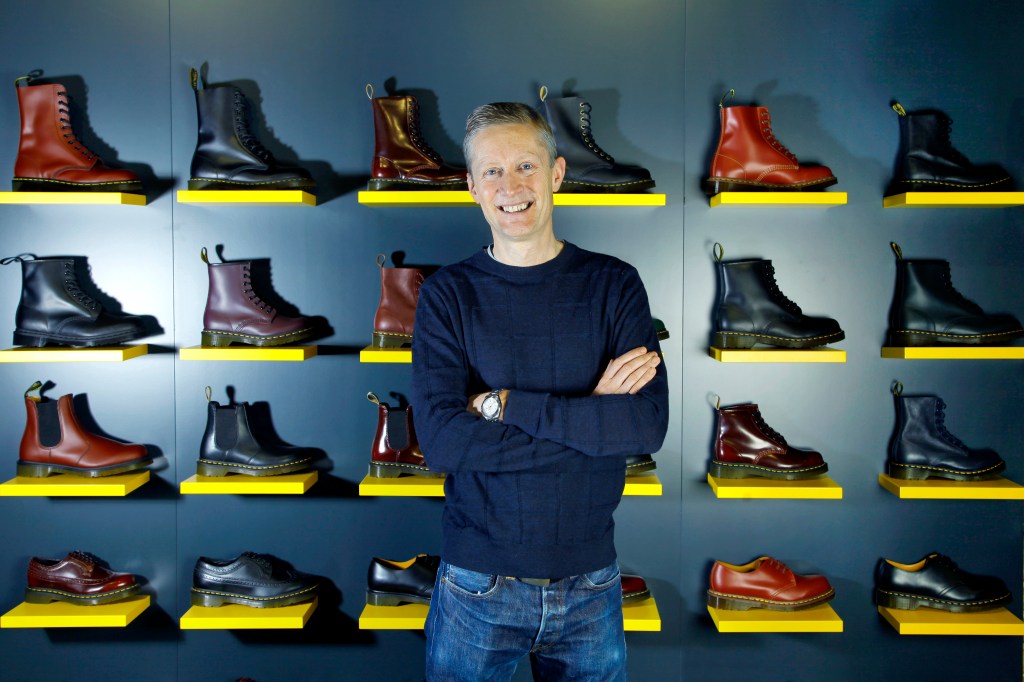LONDON – Following a turbulent tenure packed with profit warnings, and a decline in sales in the U.S., its largest market, Kenny Wilson is stepping down as chief executive officer of Dr. Martens plc.
The company said it has named Ije Nwokorie, currently chief brand officer, to succeed Wilson, and the two men will work together until Wilson steps down at the end of the financial year.
Wilson said that after six years in the role, “I feel that the time is right to hand over this year, and I am excited that Ije will be my successor. I have enjoyed working with Ije, both as a board member and in the executive leadership team in recent months, and I have seen his brand knowledge and passion first-hand. I look forward to working with him closely in the year ahead.”
Paul Mason, chair, said “Kenny’s contribution to Dr. Martens has been immense. He has spearheaded a brand-first DTC-driven strategy, achieving significant growth, with pairs more than doubling during his tenure.
“With his focus on product, brand and custodianship he has instilled a strong culture through the organization. I am grateful that he will ensure an orderly transition to Ije over the coming year, alongside our incoming CFO Giles Wilson,” Mason added.
Lynne Weedall, senior independent director and chair of the Nomination Committee, described Nwokorie as “an inspirational leader and his experience in helping drive DTC-led growth at Apple will be highly relevant in the coming years. He knows the company well, having been a non-executive director for three years, and we are already benefiting from his brand expertise since he joined as CBO in February.”
Ije Nwokorie has been named CEO of Dr. Martens, succeeding Kenny Wilson.
Wilson joined Dr. Martens from Cath Kidston in 2018 when it was still owned by the private equity giant Permira. He steered the company through the pandemic, and the company’s IPO in 2021.
Over the past years, however, the company has fallen victim to demand and distribution woes in the U.S. market, which prompted four profit warnings last year alone.
Wilson and his team have been laser-focused on repairing the U.S. business, upgrading supply chain and distribution as well as management and marketing, but certain problems are persisting.
Alongside its announcement of the CEO change on Tuesday, Dr. Martens warned that U.S. wholesale revenue is anticipated to be down “double-digit down” year-on-year in fiscal 2025.
The company said it has recently finalized the fall-winter order book, and it is “significantly down” compared with last year.
“If wholesale customers become more optimistic, we could see in-season re-orders, however these are hard to predict. Given the nature of wholesale orders, the full benefit of any restock always has a lag into the following season. The decline in wholesale has a significant impact on profitability,” the company said.
In the results update Wilson described the fiscal 2025 outlook generally as “challenging.”
He said “the whole organization is focused on our action plan to reignite boots demand, particularly in the U.S., our largest market. The nature of U.S. wholesale is that when customers gain confidence in the market, we will see a significant improvement in our business performance, but we are not assuming that this [will] occur” in fiscal 2025.
“We have built an operating cost base in anticipation of a larger business, however with revenues weaker we are currently seeing significant deleverage through to earnings. Against this backdrop, we will be laser-focused on driving cost efficiencies where possible,” Wilson said.
He added: “We also have a number of ongoing investment projects which will deliver results in outer years. We continue to believe in our DTC-first strategy and the considerable headroom for growth. Our brand remains strong, and we have a compelling product pipeline. These all give us confidence as we look beyond this transition year into future years.”
The company plans to announce its full-year 2024 results on May 30, and they are expected to be in line with guidance and consensus expectations.
The company said it saw a pickup in direct-to-consumer sales in Q4 to “high single-digit, year-on-year growth,” compared with a 3 percent decline in Q3 at constant currency.
The company said it saw good growth across EMEA, Europe, the Middle East and Africa; a flat outcome in the U.S.; and a “very strong result” in Asia Pacific, led by Japan. It added that fourth quarter group wholesale “performed in line with our expectations.”

